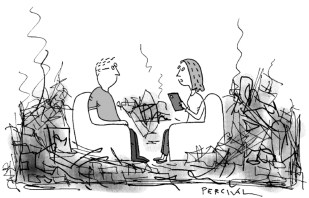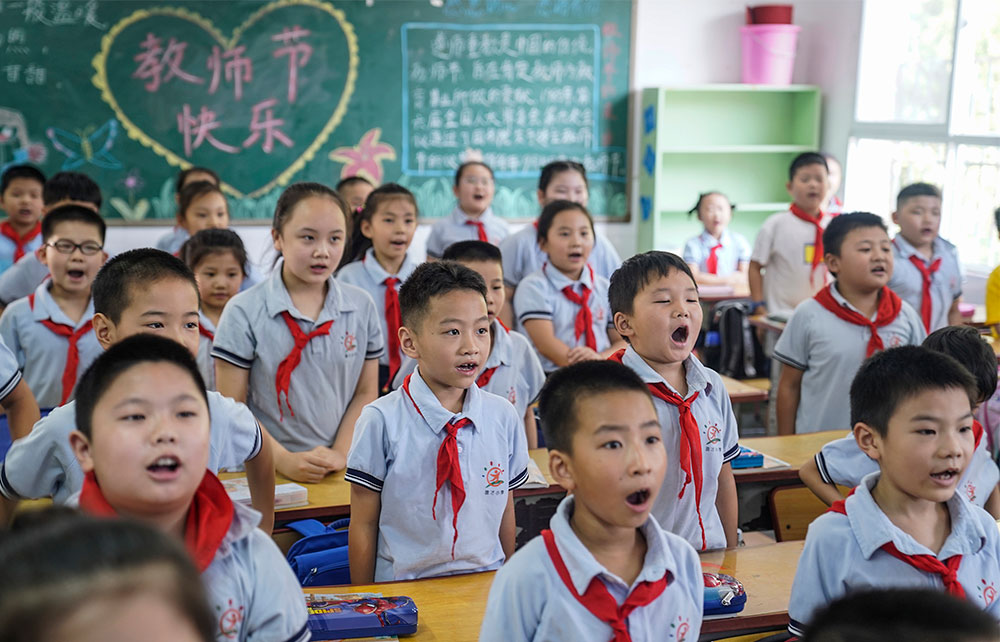Cindy Yu has narrated this article for you to listen to.
‘What’s it to do with me if your boyfriend wants to break up with you? Or if you cried, or had a fight, these are not things that I as a supervisor care about. I’m not your mother. All I care about is results. Our relationship is just employee-employer.’
In a series of videos posted on Douyin (China’s version of TikTok), Chinese tech executive Qu Jing was a little too candid about her management style. Sharply dressed and with hair cut formidably short, she said she expected her staff to be on call 24 hours a day, including at weekends, even at the cost of their personal relationships. If Qu thought these videos would give her a ‘girlboss’ image, she was wrong. They went viral and she became a national hate figure.
In my three years of primary school in Nanjing, the days were ten hours long, after which there was homework
Watching the clips, I shudder to think of the life I might be living had my mother not taken me out of China when I was a child. The graft starts young: in my three years of primary school in Nanjing, the days were ten hours long, after which there was homework until bedtime. Weekends were spent going between piano lessons, swimming lessons and painting lessons. Mum was half driven by ambition and half by fear. All the parents watched each other and their children closely, anxious that theirs might fall behind. They were made more neurotic by the fact that they could have only one child on whom to dump all their hopes and ambitions.
Teachers add to the competitiveness by ranking students according to their grades so everyone always knew who was top of class, and who was bottom. As pupils get older, exams become more pressured, culminating in the gaokao, the university-entrance examinations, which are held nationally over three days. Landing a place at a top-tier Chinese university can be as hard as getting into Harvard.
Then, work. For years, the Chinese have talked about ‘996’ – a working pattern of ‘9 a.m. to 9 p.m., six days a week’. That’s a 72-hour week. Tech mogul Jack Ma once asked: ‘If you don’t 996 when you’re young, when are you going to 996?’ The idea that for many the answer would be ‘never’ didn’t seem to occur to him.
Even in industries where 996 isn’t the norm, employees commonly compare themselves to chives and their employers to ‘chive-cutters’: after each harvest, more workers will come, just like the fast-growing chive, giving employers free rein to get all they can from each batch. People also use the word juan, which refers to endlessly intensifying competition but with fewer and fewer rewards.
Back in the 2000s, Mum could already imagine the life I’d have if we stayed in China, so we left when I was nine. I remember the process of de-acclimatisation from the Chinese regime: after school ended at 3.30 p.m., I was at a loss for what to do given there was barely any homework. I learned that English kids don’t sit straight in class or fold their arms neatly in front of them. My classmates would giggle behind their hands at the strange robotic tics which had been drilled into me by Chinese teachers.
Twenty years on, I’d like to think I’ve kept some of that drive, but I probably wouldn’t last a month in a Chinese office. Some of my peers in China have also started to rebel. It has become popular to ‘lie flat’, to take an almost philosophical stand against competition and traditional milestones: no job, no marriage, no house. Others talk about being ‘full-time children’, making a virtue out of still living with their parents. The trend has become so popular that Xi Jinping himself has waded in, warning young people that lying flat is ‘negative thinking’ and that they must continue to ‘eat bitterness’.
The government has banned 996, but something like it is still expected by many companies. Just as my mum and her friends had no choice but to compete, students, employees, employers, companies are all in an endless race. It’s partly down to China’s size (competition will always be fierce in a country of 1.4 billion people) and partly down to the gulf between rich and poor (the top 10 per cent of the population earn two-fifths of the national income, akin to the US). Add millennia of Confucianism to that and you have what one Chinese-Kiwi academic described as a combination of ‘unrestricted global capitalism and a Confucian culture of hierarchy and obedience’.

In this environment, several tech workers have died (from suicide or overwork) in the past few years. And the situation is getting worse: the Chinese Communist party’s crackdown on tech giants has meant that once-great companies are reducing headcount and freezing hiring, while China’s youth unemployment rate is roughly 15 per cent. Qu’s comments were essentially punching a bruise.
So I actually feel a little sorry for her. She’s not an easy character to defend (in another interview, she is unrepentant about forgetting one son’s birthday and the other son’s age), but she’s hardly the only demanding boss in the country. Competition, discipline and obedience to authority are baked into people’s lives from school to retirement. As one Chinese pundit said on Weibo: Qu’s mistake wasn’t to think what she thought, but to say it out loud.
And does Qu not also have a point? The Chinese work ethic (or rather the Asian work ethic, as similar cultures exist in South Korea, Japan and India) has been a driver of success, and in the success of Asian emigrés. In the UK and the US, the Chinese diaspora consistently outperform the white majority and most other ethnic groups on grades and earnings. I struggle to believe that’s nothing to do with the Asian tiger mother.
The West could probably do with a little more of that.








Comments